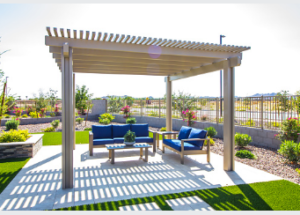Pergolas provide structure and beauty to any backyard space, making it an inviting focal point or relaxing spot. Furthermore, pergolas can be built over fire pits or outdoor kitchens to create cozy gathering spots.
 SuperbPergolasNDecks pergola Adelaide can be designed by professional landscape designers or purchased as kits to install yourself; they add value and are worth investing in.
SuperbPergolasNDecks pergola Adelaide can be designed by professional landscape designers or purchased as kits to install yourself; they add value and are worth investing in.
Wood
A pergola is an eye-catching outdoor structure that adds style and versatility to your garden or backyard. You can use it to create focal points or section off areas for different uses in the garden; additionally, it provides shade from sunlight or rain and may provide protection.
Wood pergolas are popular as it allows users to customise them easily to meet their space and style requirements without needing special tools for assembly. Furthermore, wooden pergolas are resistant to rot and insects – an important consideration when exposed to outdoor elements.
Various wood species are available for pergolas, from tropical hardwoods like ipe to more traditional softwoods such as cedar or fir. Not all woods are suitable due to the demands of outdoor use – cedar, larch, and Douglas fir are good choices because they’re durable and naturally rot-resistant.
Pine is another budget-friendly material to construct a pergola but requires regular staining to prevent rotting and insect damage, in addition to being treated with preservatives which could potentially be toxic to both people and pets, making this material not the greenest choice.
Metal
Metal is an increasingly popular alternative to wood as a sustainable building material, offering increased durability in terms of resistance to issues like rot, warping and insect damage. Rusting may occur upon prolonged moisture exposure; however, galvanising or coating structures with metal can protect them and ensure longer-term performance and fewer maintenance costs than wood structures. Metal SuperbPergolasNDecks pergola Adelaide costs more upfront but has longer-term lasting power with reduced upkeep costs required over its lifespan.
Wood is an earthier alternative to metal and offers plenty of design choices for gardeners. Staining or painting provides endless style possibilities that complement any environment. Cedar and other naturally rot-resistant woods have an aromatic fragrance and are easier to treat with pesticides or fungicides than other varieties; however, their combustibility may require regular painting/staining maintenance to maintain their durability.
When planning to construct a wood pergola, it is vital that you understand its setbacks and whether they require approval by your neighbourhood association’s architectural committee. Furthermore, you must determine the size and number of piers attached to a nominal-size concrete pad. Holes must then be dug for them – we suggest using screws rather than nails as this allows for easier removal/replacement should damage occur later; our HeadLOK and VersaLOK screws provide fast installation times while offering excellent holding power ensuring a secure install!
Glass
Adding glass panels to a pergola is an attractive way to modernise it and enjoy its benefits while protecting it from rain or cold temperatures.
Your choice of glass for your pergola depends entirely upon personal taste and desired shade levels. From clear to tinted pieces that offer stylish looks and enhance the natural lighting in outdoor spaces. Glass can also be installed as a roof or wall surfaces and fixed or sliding mechanisms depending on what works best in each location – often integrated as permanent fixtures into wall-mounted pergolas but it may also be added onto free-standing structures.
Aluminium
Aluminium is an incredibly resilient and reliable metal suitable for making pergolas. Being lighter than steel, aluminium has quickly become the go-to material in recent times for modern pergola construction projects. Pergolas made with aluminium are usually coated with an exterior coating designed to repel water, providing resistance against rust and corrosion. Wood pergolas may also be constructed; however, they require more extensive care in terms of protection from moisture than their aluminium counterparts; wood structures must be regularly sanded down and re-stained to keep moisture at bay; otherwise, rot and pest infestation could quickly destroy their beauty.
Wood is ideal for residential gardens or backyard projects, while commercial landscape installations often have specific needs that traditional wood construction cannot fulfil. Aluminium structures provide an effective yet cost-efficient solution than wooden ones for landscape installations, with fewer ongoing maintenance requirements as an added perk.